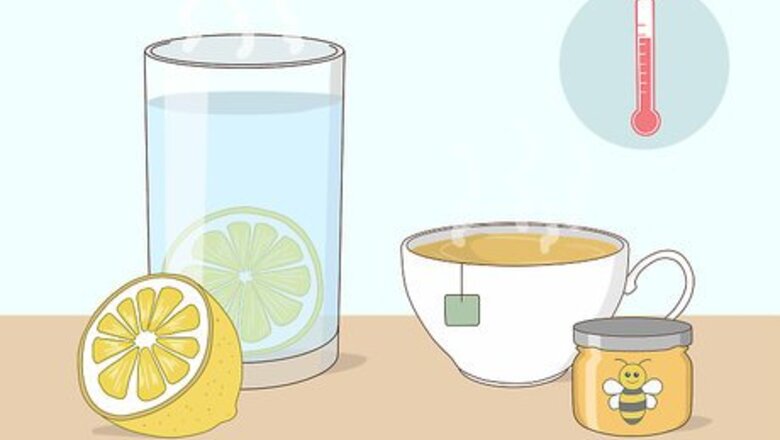
views
- Drink a warm beverage like tea to soothe your throat quickly. Avoid dairy and acidic beverages like orange juice.
- Suck on cough drops or hard candy to stop coughing. Gargling with salt water can also help in a pinch.
- Take a steamy shower or use a cool mist humidifier in your space. Breathing in moist air can soothe a cough caused by dry air.
Have some honey.
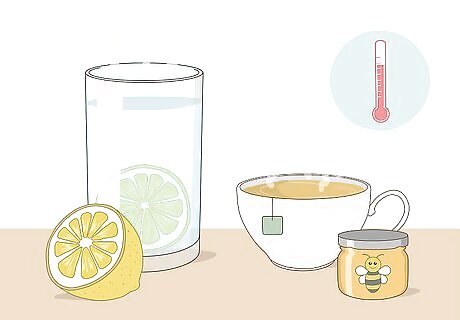
Honey soothes your throat, reducing the severity of your cough. Add 2 tablespoons (30 mL) of honey to a cup of tea or warm water before drinking. By itself, honey can alleviate pain and help fight illnesses. When combined with warm drinks like tea, it’ll work quickly to suppress your cough and make an irritated throat feel less scratchy. If you don’t like tea, you can also simply eat the honey on its own to get the same soothing effect. Taking honey (either on its own or in a drink) before bed can be especially helpful in reducing your cough and getting a good night’s sleep. Never give honey to a child under 1-year-old due to the risk of infant botulism.
Gargle with salt water.
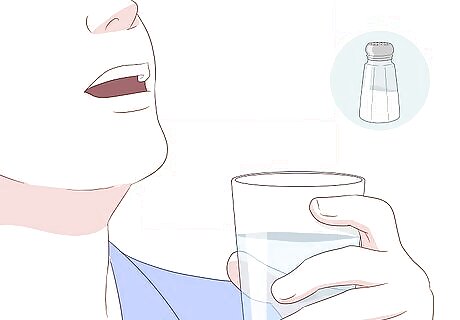
Gargling will help get rid of the postnasal drip that’s making you cough. Mix ½ teaspoon (3 grams) of salt with 8 fluid ounces (240 mL) of warm water, then gargle with the solution until it’s all gone. Saltwater can kill the germs causing your sinus issues and flush the mucus out of your throat, thus reducing the need to cough. It can also cut down the total duration of your cough! You can gargle 2 to 4 times each day as needed to relieve your symptoms. It’s especially important to drink lots of water between gargling, so the salt doesn’t dry you out too much.
Drink a cup of ginger tea.
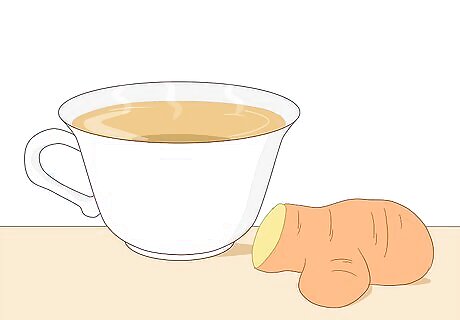
Warm tea can help break up mucus in your airways and stop the cough. Herbal tea is known for its ability to soothe a cough—especially ginger tea since ginger has anti-inflammatory properties of its own. When your cough is caused by congestion and clogged sinuses, making and drinking ginger tea will break up mucus while reducing inflammation in your throat. If you don’t like ginger, any herbal tea will help. You could even drink hot water with lemon juice for quick cough relief.
Try a cough lozenge.
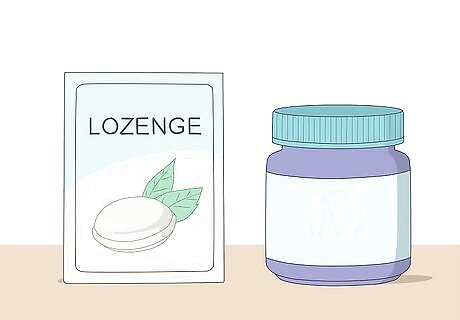
Lozenges soothe your throat, reducing the urge to cough. Sucking on a cough drop or hard candy will also increase your saliva production, which in turn alleviates a cough. If you need momentary relief, especially if you’ll be out in public for a while, bring a few cough lozenges you can pop in your mouth whenever you need to stop coughing. Lozenges specifically designed for a cough or sore throat may also contain menthol, which relieves discomfort and produces a cooling sensation. However, any hard candy will help get rid of your cough in a pinch!
Suppress the cough with breathing exercises.
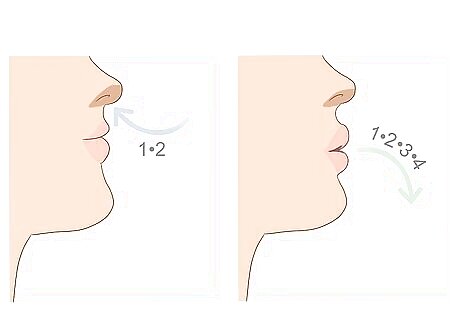
Breathing exercises can calm an overly sensitive coughing reflex. Put a hand over your mouth and swallow. Then, take a small breath in and out. Hold your breath for 5 to 10 seconds before taking more small, careful breaths for 30 seconds, resisting the urge to cough. Finally, take a single slow and steady breath through your nose and repeat the exercise until the urge to cough goes away. Even when you’re not doing exercises, try to breathe through your nose as much as possible and swallow instead of coughing. This can be especially helpful if you’re out in public or class and want to stop coughing quickly. Many breathing exercises target chronic conditions such as chronic obstructive pulmonary disease, but anyone with a cough can use them!
Use nasal spray.
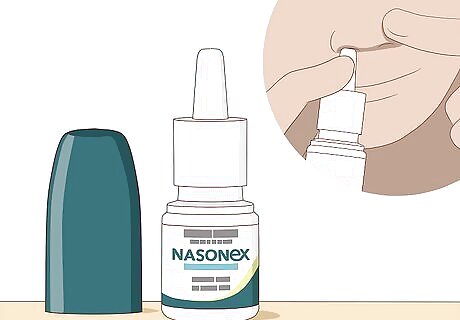
Nasal sprays can treat allergy symptoms, including a cough. Choose a nasal spray like Flonase or Nasonex, designed to treat postnasal drip associated with allergies, and use it as directed on the package. It may also help to pair a daily allergy relief pill (also called an antihistamine) like Zyrtec or Claritin with the nasal spray for the best effect. A cough caused by allergies can be seasonal or year-round. You might even be able to predict when you’ll get one and catch it early.
Take a dose of cough medicine.
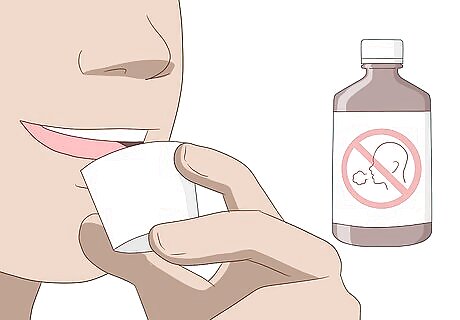
Cough medicine gets rid of mucus and blocks your coughing reflex. Consider giving an over-the-counter cough medicine a shot, especially if you’ve already tried every other immediate cure. If you’ve been coughing up mucus, use an expectorant to help expel it from your airways. Otherwise, use an antitussive, which will suppress the urge to cough. When in doubt, check with your doctor before choosing a cough medicine, even when it’s over-the-counter. Follow all instructions and dosage guidelines on the package. Don’t give any cough medicine to children younger than 4 years old. For children aged 4 to 6, only use cough medicine recommended by their doctor.
Try heartburn medicine.

Heartburn medicine relieves a cough caused by acid reflux. If you have a persistent cough accompanied by other symptoms like a burning sensation in your chest (heartburn) and food backwash (regurgitation), then acid reflux is likely the cause. Take an antacid like Pepcid or Prilosec to relieve your acid reflux and, in turn, get rid of the associated cough. If your acid reflux becomes chronic, it might also help to change your diet. Cut back on acidic foods like chocolate, citrus fruits, onions, tomatoes, and foods that are high in fat. Eat more high-fiber foods like brown rice, oatmeal, root vegetables (like potatoes), lettuce, and celery.
Use a neti pot.
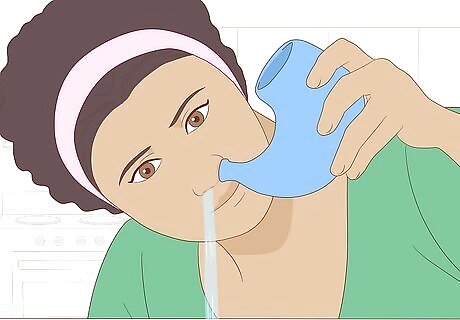
A neti pot allows you to flush out your nasal passages and clear mucus. They’re irrigation devices designed to offer relief from sinus infections and allergies. Fill it with a saltwater solution use the neti pot by tilting your head sideways over the sink and gently pouring the solution into your upper nostril. Let the liquid drain into your lower nostril, then repeat on the other side. You can either use a store-bought saline solution for this or make your own saline solution by combining salt with boiled and cooled water. When your cough is caused by postnasal drip (which results from a cold, allergy, sinus infection, or airborne irritants), the trick to getting rid of the cough is treating your sinus issues.
Get into a hot, steamy shower.
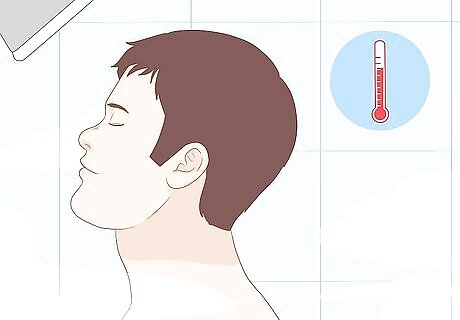
Steam moistens your airways, easing your dry cough. When you have a bad cough, take a hot shower with the doors and windows of your bathroom closed. This allows steam to build up, and the humidity from the steam will instantly begin to clear out your sinuses and thin out the mucus there. If you don’t want to take a bath or shower, just run the hot water and sit in your bathroom for about 15 minutes, breathing in steam. Not only will steam relieve your cough but it’ll also clear congestion and sinus pressure if you’re sick (or have allergies).
Hydrate with lots of water.
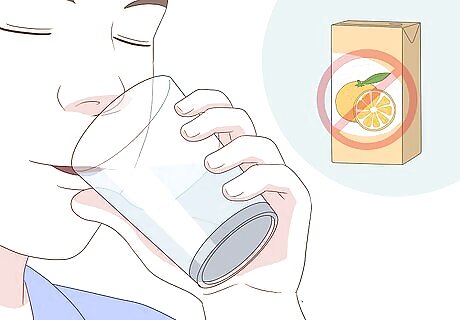
Staying hydrated is your first line of defense against coughing. If your cough stems from a dry throat, a little hydration might be all you need. Even if your cough is caused by something else, like a cold or flu, drinking plenty of fluids will ease your symptoms and help you recover faster. Women should drink about 11 cups (2.6 L) of water daily, and men should drink around 15 cups (3.5 L). If your throat is sore, avoid acidic drinks that might irritate it further, including orange juice, coffee, and alcohol. Avoid dairy products like milk if you have a wet cough and lots of phlegm, as milk can make your throat feel worse. However, cold dairy products can be soothing for a dry throat.
Turn on a cool mist humidifier.
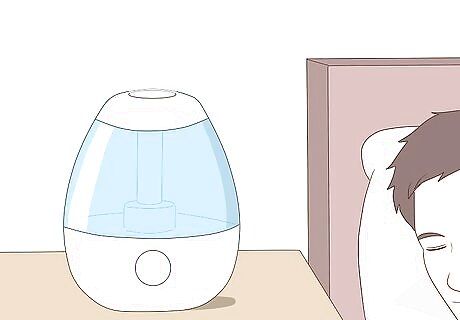
Humidifiers keep your airways moist to ease a dry, hacking cough. When the air is dry, it also dries out your throat—possibly even irritating your airways enough to cause a cough. To keep the air moist, set up a cool mist humidifier (or vaporizer) wherever you plan to spend most of your time. Using one in your bedroom at night can be especially helpful to ensure your cough doesn’t keep you up. Even if you have a wet cough caused by mucus, a humidifier will help hydrate your sinuses enough to thin out the mucus—making it easier to cough up.
Prop your head up at night.
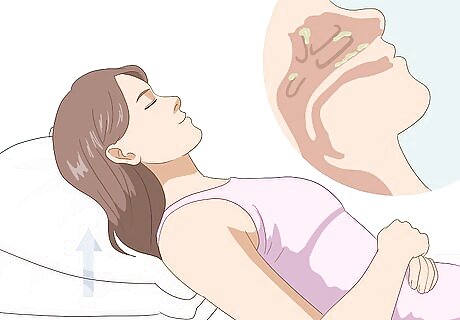
Staying upright prevents mucus from draining into your throat. Does your cough get worse when you lay horizontally? This is because it causes mucus to pool in your throat, triggering a stronger coughing reflex. Sleep with several pillows at night so you can prop your head up and let any mucus in your sinuses drain away. This is also helpful if you have a nighttime cough caused by acid reflux, as sleeping with your head elevated alleviates the symptoms.
Eat food with probiotics.
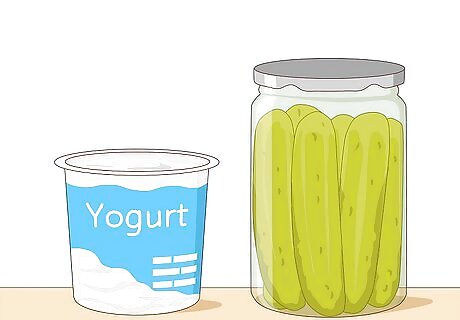
Probiotics can both reduce coughing and fight off the common cold. While they’re mainly known for promoting good gut health, probiotics will also help with your cough over time. Foods that contain probiotics include yogurt and fermented foods like miso, sauerkraut, pickles, kombucha, tempeh, and kimchi. If fermented food isn’t your thing, you can also use probiotic supplements to get all the good bacteria you need.
Limit your exposure to irritants.
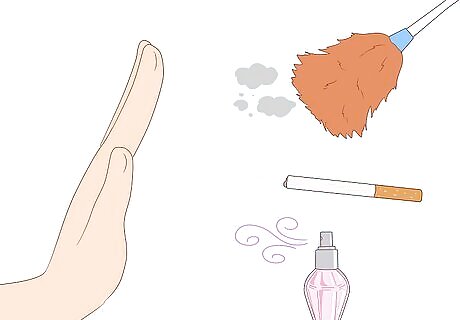
Irritants and allergens in the air might be the source of your coughing fits. Particulates in the air irritate your throat and lungs, causing a cough or worsening one that already exists. Cigarette smoke, allergens like dust and pollen, and even strong fragrances like perfume may be the culprit. Stay away from places that contain known irritants in the air, and your cough will clear up. If avoiding certain areas isn’t enough, use an air purifier to remove allergens and irritants from the air in your home.
Quit smoking.
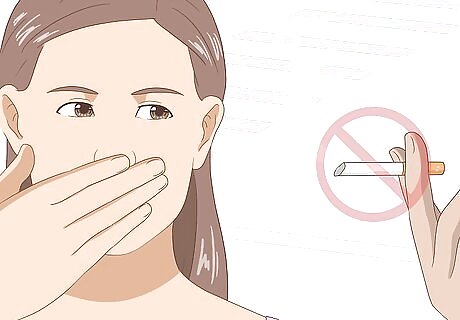
The chemicals in cigarettes cause a progressive cough over time. Being around cigarette smoke is one thing, but smoking cigarettes yourself is even more damaging. You may develop a cough that gets worse based on how much you smoke and how long you’ve been doing it. Quit smoking as soon as possible to reduce the inflammation in your lungs and stop the cough.



















Comments
0 comment